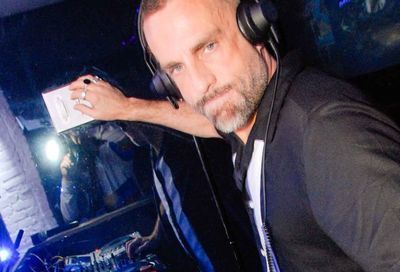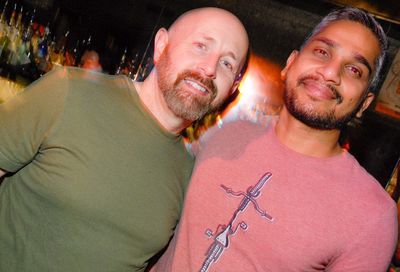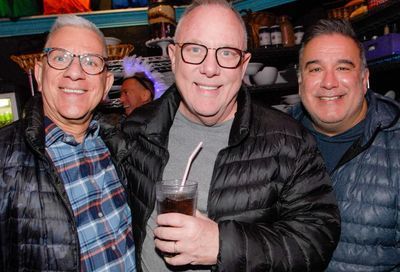Whitman-Walker puts its best foot forward with this year’s Walk & 5K to End HIV
Whitman-Walker Health's celebrated annual event will be held virtually for the second year in a row on Oct. 23

“I think one of the things I’ve always appreciated about the Walk is that it is often the way people feel most comfortable expressing their own experiences with HIV,” Abby Fenton says of the Walk to End HIV.
“When I send fundraising appeals to my friends and colleagues and business associates, I can’t tell you how amazing it is to hear the stories that people offer in response to that, detailing their own personal connection to HIV and to the epidemic,” adds Fenton, the executive director and chief external affairs officer of the Whitman-Walker Foundation.
“I’ve had friends who I didn’t know had any contact with HIV share really intense, passionate, beautiful, sad stories. That’s something that’s always struck me about the walk: it’s a way for people to feel that they can personally do something to find a cure or support the work to end HIV.”
Due to the COVID-19 pandemic, the annual fundraiser, which raises money for Whitman-Walker’s HIV prevention, testing, and treatment services, will be held virtually for the second year in a row. Registration for the event, in which racers are encouraged to walk or run various 5-kilometer routes, is free in order to encourage greater participation.
“What we’re asking folks to do is to go online to WalktoEndHIV.org and register, start a team, or join a team,” says Dave Mallory, Whitman-Walker’s senior director of annual giving, who has been with the community health center for the past 17 years. “If people raise or donate $35, they get a commemorative T-shirt recognizing the 35th anniversary of the walk. “We’re encouraging folks to reach out to their networks, friends, families, and co-workers just to raise as much money as they can to help us reach our goal of $450,000.”
Participants can pick up T-shirts at Whitman-Walker’s LIZ building, the site of the former Elizabeth Taylor Medical Center, at 1377 R Street, NW, on Friday, Oct. 22, from 3-7 p.m. and on Saturday, Oct. 23, the day of the virtual race, from 9 a.m.-12 p.m. Staff will also be on hand at Max Robinson Center, at 2301 Martin Luther King Jr. Ave. SE, on that Saturday to hand out last-minute T-shirts or registration packets.
Whitman-Walker has mapped out two different possible routes for people to run or walk on Oct. 23. The first route will traverse the area around Logan Circle and 14th Street, where the health center’s Northwest D.C. properties are located, while the second route will run from the Max Robinson Center in Anacostia to the campus of St. Elizabeths, where Whitman-Walker Health will open a new health center in 2023.
“We’re going to have staff available at our LIZ location and Max Robinson to cheer folks on [and] let them pick up T-shirts if they couldn’t earlier,” says Mallory. “So we’re trying to add back some element of in-person fun and the sense of community the Walk has always been known for.”
Naseema Shafi, the chief executive officer of Whitman-Walker Health, notes that despite the 35th anniversary of the walk — which also coincides with the recent 40th anniversary of the first documentation of AIDS-related illnesses — organizers are downplaying some of the fanfare that would normally be associated with such a big milestone.
“There’s so much more we could be doing to mark this moment, but it’s hard to do that in this virtual space. So we’re going to do the best we can to promote the event, but look forward to the opportunity to celebrate with the community more once we can resume in-person events,” she says. “I hope we can be together, in person, next fall.”
Despite the pandemic, Shafi says that the need for financial support from the community hasn’t ebbed, hence the goal of raising $450,000 from this year’s virtual walk and run. Fenton notes that, despite the stresses that some businesses have experienced due to pandemic-related shutdowns, corporate support for the walk has not dissipated.
“In the conversations I’ve been having with our corporate sponsors, they’ve allotted money for us in their budget because they know just how important the walk is and how important Whitman-Walker is to the community,” she says. “And I think they’re also thrilled to find ways to engage their staff again. We tend to forget how important that piece of it is, but so many of our sponsors have formed various teams, and gotten their staff to participate in the past.
“I think it’s something that employers are utilizing so say, ‘Hey, you can be socially distanced outside and engage with your co-workers.’ In fact, we had one team from Knowland” — an Arlington-based web-based software company that develops products and services for the hospitality industry — “who knew they couldn’t walk with us on Oct. 23, and held a walk in Arlington on a Friday afternoon to help fundraise for us,” notes Fenton.
“We certainly recognize that the pandemic has placed strains on folks and local businesses and restaurants and entire industries,” adds Mallory. “But we’ve been fortunate, and pleasantly surprised, at the response from our major corporate sponsors. We’ve even brought on some new sponsors, which is inspiring, especially in the middle of a pandemic. That may be partially because of the anniversaries that are coinciding, the 35th anniversary of the walk and the 40th anniversary of the identification of HIV as a public threat.
“But I also think the fact that we were on the frontlines of the pandemic during COVID, doing testing, providing vaccines, and things of that nature, showed how important we are to the public health of the community, and maybe that’s why we’re seeing really strong support from the business community.”
Mallory, who became involved in the Walk to End HIV (at the time AIDS Walk) prior to working at Whitman-Walker, notes that the event has evolved over the years as newer medical developments have changed the scope of the epidemic and shifted the approach that medical providers take in combating the spread of HIV.
“It’s hard for a lot of folks to remember that AIDS Walk, at the time, was one of the very first 5Ks that was developed to combat a public health threat,” he says. “The nature of the walk has changed over the decades because the nature of the epidemic has changed. The early years were more of a combination of fundraising and political protest, to raise the visibility of the issue and to combat government indifference.
“As we’ve had advancements in prevention and community health education, people are living longer, healthier lives, so the nature of the walk has shifted a bit. But the walk has always been about the community coming together [and] recommitting themselves to the fight against HIV.
“It’s always thrilling for us, at Whitman-Walker, to see the support we have in the community, to see our patients, those we served as we worked side-by-side, come together, year after year. That’s the real legacy of the walk.”
Shafi says that while current-day medical providers have many more tools at their disposal to prevent or to treat HIV, there are still massive inequities in the way that people access health care, which can affect medical outcomes.
“We still have diagnoses occurring in communities of color, underscoring the need for more education and outreach, as well as addressing social determinants of health,” she says. “We actually recently looked at some of our data and found that transportation was a big barrier for our patients coming in for care, which makes complete sense in a pandemic, when people aren’t using transportation in the way they were before.
“But now that we have telehealth, that gives us an opportunity to think about how we spend as much as we can electronically and do as much of this care as we can virtually. And we have actually had opportunities to get patients in the community connected with cell phones with data plans. So we’ve been able to address the technological barriers that people face, but it does require extra resources,” she notes.
Shafi is particularly excited about the prospect of the new, larger health center on St. Elizabeths campus in Southeast D.C., which will allow Whitman-Walker to triple its patient load while providing easier access for some of the health center’s most vulnerable patient populations, especially those located east of the Anacostia River.
“The St. Elizabeths campus is a huge opportunity for us. If you pull up a city map and look at the distribution of HIV in the city, Wards 7 and 8 are disproportionately impacted,” she says. “The Max Robinson Center site is great, but it’s small. This site is going to be closer to the Metro, which is going to be great. And there’s going to be a lot of other health care-related development on the campus with what’s happening with GW [George Washington University] hospital and the partnership that GW has to staff the hospital.
“In terms of capacity alone, when we look at what happened in Northwest when we opened our 1525 site and relocated services from the old Elizabeth Taylor Medical Center, we experienced a huge increase in patients,” adds Shafi. “So a new facility, new staff, and more staff will make a big difference on people’s ability to access care. I can’t wait to have this conversation with you in 2024 to be able to show how much we’ve been able to deliver.”
The Walk and 5K to End HIV will be held virtually from 9 a.m. to noon on Saturday, Oct. 23. Proceeds raised will benefit Whitman-Walker Health’s HIV-related prevention, testing, and treatment services. For more information, or to register, visit www.walktoendhiv.org.
Read More:
BHT Foundation doles out more than $35,000 to local LGBTQ and HIV nonprofits
Former AG Ken Cuccinelli attacks Mark Herring for not defending Virginia’s gay marriage ban
Harvey Guillén talks Shadows, Reacher, and what might happen if Guillermo became a vampire
Support Metro Weekly’s Journalism
These are challenging times for news organizations. And yet it’s crucial we stay active and provide vital resources and information to both our local readers and the world. So won’t you please take a moment and consider supporting Metro Weekly with a membership? For as little as $5 a month, you can help ensure Metro Weekly magazine and MetroWeekly.com remain free, viable resources as we provide the best, most diverse, culturally-resonant LGBTQ coverage in both the D.C. region and around the world. Memberships come with exclusive perks and discounts, your own personal digital delivery of each week’s magazine (and an archive), access to our Member's Lounge when it launches this fall, and exclusive members-only items like Metro Weekly Membership Mugs and Tote Bags! Check out all our membership levels here and please join us today!





















